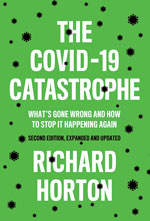Volume 27, Number 11—November 2021
Books and Media
The COVID Catastrophe: What’s Gone Wrong and How To Stop It Happening Again, 2nd Edition
Cite This Article
Citation for Media
Richard Horton
Polity, Cambridge, UK, and Boston MA, USA, 2021
ISBN-10: 1509549102;
ISBN-13: 978-1509549108
Pages: 180; Price: $59.95 (Hardcover); $6.70 (Paperback)
After half of the adult population in the United States has been fully vaccinated against coronavirus disease (COVID-19) to date (1), we seem to finally see the light at the end of the tunnel, after a 1.5-year battle with the most unprecedented public health crisis in modern history. We are reckoning with devastating mid-pandemic chaos caused by avoidable mistakes that have added to adverse outcomes.
In this second edition of The Covid-19 Catastrophe: What’s Gone Wrong and How to Stop It Happening Again, Richard Horton, a medical expert and editor-in-chief of Lancet, leads us to revisit the COVID-19 crisis with his acumen, sharp arguments, and strong conscientiousness (Figure). Published in January 2021, this newer edition features updated epidemiologic numbers on COVID-19 and provides better data that account for discoveries and perspectives in the second half of 2020.
Before the main body, the author added a comprehensive introduction to explain the biology of the COVID-19 coronavirus and challenges of vaccine development and distribution. It also summarizes major lessons learned in response to COVID-19. Horton addresses awareness of the “terrible human cost” caused by lockdowns and potential long-term consequences that could afflict COVID-19 survivors.
Chapter 1 describes the origin of the COVID-19 pandemic by reviewing spread of the pandemic and responses from each country and the World Health Organization with a clear timeline. In Chapter 2, Horton engages the reader by asking, “Why were we not prepared?” A critical reason that most countries were unprepared was an underestimation of the danger of the coronavirus by political leaders and the general public, despite lessons learned from outbreaks of Ebola and Zika.
Chapters 3–5 further discuss the “disturbing twists” that might explain why countries were unprepared for COVID-19. Chapter 3 praises the efforts of frontline health workers and scientific groups in providing dependable knowledge regarding COVID-19 and criticizes indecisive policymaking in handling the emergency. In Chapter 4, Horton analyses responses of various countries and identifies elements needed to have a robust and resilient health system capable of responding to such a pandemic. Chapter 5 details the failures of government responses to COVID-19 and discusses how political misinformation played a role in the failure.
Chapter 6 offers a thought-provoking philosophy that emerging risks and problems we encounter today might result from our own developments (2). This chapter and the epilogue conclude with Horton’s opinions on the impact of COVID-19 on our future, and strategies that help prepare us for the next pandemic. It is indispensable for the World Health Organization to strengthen its global coordinating role by mobilizing resources and establishing an accountability mechanism.
The book is replete with straightforward facts and honest, bold, and sometmes furious arguments that show how COVID-19 is much more than merely a health crisis. “It is a crisis about life itself,” Horton writes. Although Horton makes some repetitive points throughout the book, we found it informative and a compelling reflection on the COVID-19 pandemic. It is a fascinating read for health professionals and nonhealth professionals who wish to understand the full scale of the cataclysmic pandemic we are currently experiencing.
References
- Centers for Disease Control and Prevention. COVID-19 vaccinations in the United States [cited 2021 May 24]. https://covid.cdc.gov/covid-data-tracker/#vaccinations
- Wimmer J, Quandt T. Living in the risk society: an interview with Ulrich Beck. Journalism Stud. 2006;7:336–47. DOIGoogle Scholar
Figure
Cite This ArticleOriginal Publication Date: October 07, 2021
Related Links
Table of Contents – Volume 27, Number 11—November 2021
| EID Search Options |
|---|
|
|
|
|
|
|

Please use the form below to submit correspondence to the authors or contact them at the following address:
Lizheng Shi, Health Policy and Management, Tulane University School of Public Health and Tropical Medicine, 1440 Canal St, Ste 1900, New Orleans, LA 70112-2703, USA
Top